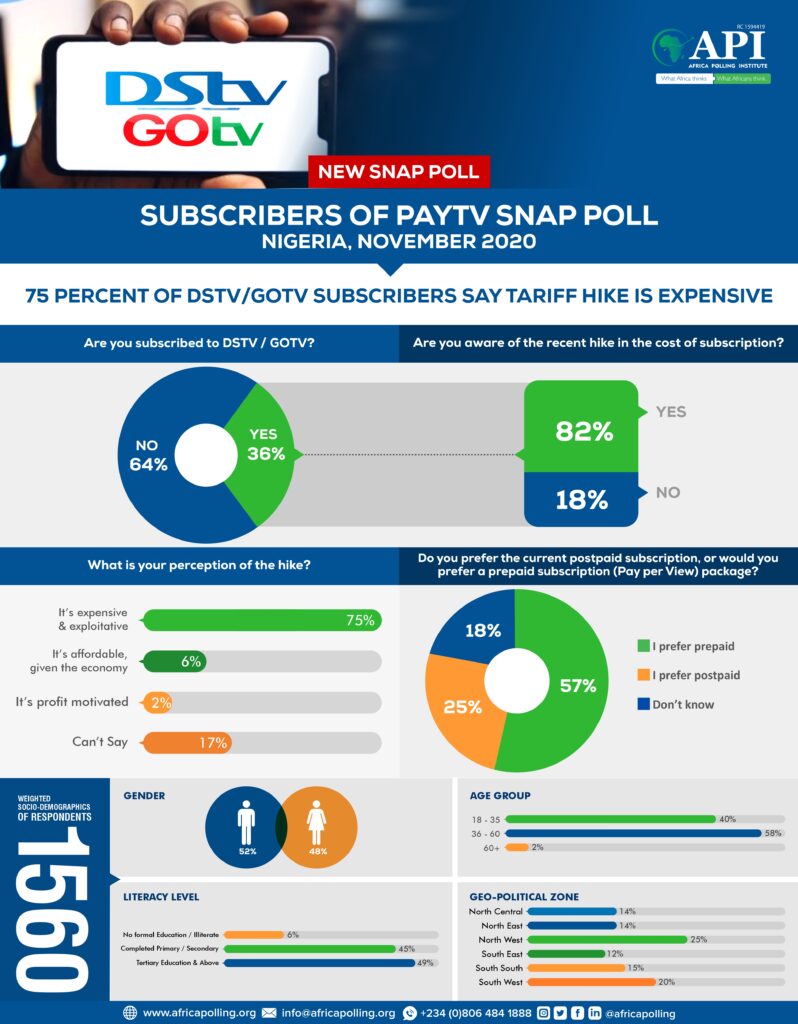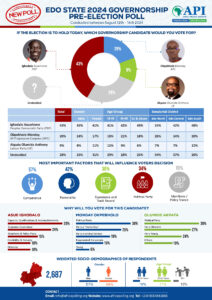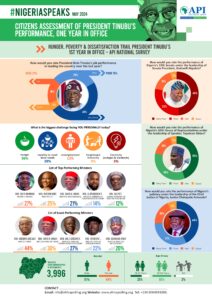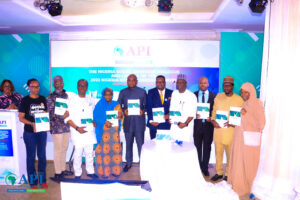Abuja, Nigeria, November 5, 2020 – Today, Africa Polling Institute (API), an Abuja-based opinion research thinktank released a new snap poll on the recent DStv tariff hike in Nigeria. The poll was conducted to investigate the
perception and opinions of Nigerians regarding the hike in tariff, alongside citizens’ perception on their preferred
subscription package. This poll forms a crucial part of API’s efforts at deepening citizens’ engagement and
contributing meaningfully by providing data on current issues, considering the recent clamor from Nigerians on the
exploitative nature of DStv over the years and its failure to adopt a prepaid subscription model. Findings from the
poll revealed that given the current state of the country, and the attendant impact of the recent COVID-19
pandemic, a large majority of Nigerians (75%) considered the recent increase in DStv tariff as too expensive and
exploitative. Further findings revealed that 6% of Nigerians were of the opinion that the recent tariff hike is
affordable given Nigeria ranks low in ease of doing business, and a paltry 2% of surveyed citizens consider the
increase in DStv tariff as profit motivated. In addition, 57% of Nigerians said they prefer a prepaid subscription
model, while on the contrary, 25% opined that they prefer the current postpaid subscription model.
The nationwide poll was conducted in the last week of October, between the 26th and 30th October 2020 via
telephone interviews, and using a Stratified Random Sampling technique. A total of 1560 completed interviews
were captured in the poll out of 4217 calls made representing a response rate of approximately 37%. The sample
comprised of 52% Male and 48% Female respondents whose age ranged from 18 years and above. The interviews
were conducted in five major Nigerian languages: English, Pidgin, Hausa, Igbo and Yoruba; and geographic quotas
were assigned to ensure the selection of a nationally representative sample, which proportionately covered all
senatorial districts and states, including the FCT
Overview of Cable Television Services in Nigeria
Africa’s cable television subscribers are expected to hit 47.26 million by 2025, up from 30.70 million in 2019. This
rise will be driven majorly by the Nigerian market which is projected to add 10 million more subscribers, having
overtaken South Africa in 2020¹. The major operators of cable television in Nigeria are South Africa’s MultiChoice
and China’s StarTimes, both having a market share of about 93% of the regions cable television subscribers in 2019².
These companies offer several entertainment bouquets including; news, music, movies, sports, lifestyle & culture,
documentaries etc.
In Nigeria, the market for cable television has been on the increasing trend since MultiChoice company gained
traction in the Nigerian market in 1995; providing Digital Satellite Television (DStv) and recently GOtv. At the
present, there are over 3.4million active cable television subscribers in Nigeria, constituting 14.5% share of the total
Africa cable television market³. Obviously, DStv currently dominates the Nigerian digital television space with a
market share of 1.5 million subscribers⁴, notwithstanding the presence of other operators such as; StarTimes Tv,
Kwese Tv, Daarsat Tv, Consaat Tv, and recently TSTv. Glaringly, MultiChoice (operators of DStv and GOtv) has made
significant investments that have contributed to the growth of Nigeria’s creative sector, and by extension the
Nigerian economy.
According to a 2019 Socio-Economic Impact Report⁵ produced by Accenture, for the period 2016 to 2019,
MultiChoice contributed about N363bn to Nigeria’s GDP and employing over a thousand individuals through its
supply value chain⁶. However, in the last few years, there have been several complaints and disaffection by cable TV
subscribers, especially with regards to the DStv and GOtv pricing system. These service providers compel
subscribers into a monthly billing pricing system, irrespective of service quality, the conditions of viewing or even its
availability. Recently there have been concerns by Nigerians over the hike in tariff and monopolistic bouquets by
DStv. Besides the rising subscription cost, most subscribers strongly consider the monthly billing pricing system as
being exploitative and unfair especially to working class Nigerians who spent relatively few hours at home. In this
wise, subscribers have been yearning for the adoption of pay-per-view billing model, that gives customers the
option to only pay for what is consumed, either on a daily, weekly, or monthly basis. The request for a prepaid
pricing model by Nigerians is due to the fact that majority of Nigerians have poor electricity supply, as such the
monthly subscription plan is underutilized and not sustainable.
Emanating from these complaints, in 2016, the Nigeria’s Consumer Protection Council (CPC) directed MultiChoice
company (the operator of DStv and GOtv) to adopt a flexible pricing system after confirming the allegations of
violations of consumers’ rights. Again in June 2020, the House of Representatives through its Ad Hoc Committee
equally ordered DStv and other cable television companies to begin immediate implementation of the pay-per-view policy as well as reduction in subscription cost⁷. Despite these efforts at regulating these cable television
service providers, the concerns by subscribers have remained unaddressed. However, the inordinate increase in
tariff over the years has been ascribed to the near monopoly enjoyed by DStv⁸in the industry. Figure 1 below shows
the increasing trend of DStv premium subscription over the last 5 years.
¹hps://www.digitaltvresearch.com/ugc/Africa%20Pay%20TV%20Forecasts%202020%20TOC_toc_269.pdf
²hp://www.financialnigeria.com/nigeria-to-overtake-south-africa-in-pay-tv-subscripon-in-2020-news-2026.html
³hps://nairametrics.com/2017/11/03/112389-2/
⁴Ibid
⁵hps://mulchoiceafrica.com/about-us/our-operaons/nigeria/
⁶Ibid
⁷hps://www.pmnewsnigeria.com/2020/06/30/ending-the-cable-tv-profiteering-in-nigeria/
⁸hps://businesspost.ng/featureoped/breaking-dstvs-monopoly-paytv-nigeria/
Key findings from the Snap Poll
The Snap Poll asked respondents four (4) key questions ranging from whether or not they own a DStv/GOtv,
awareness of the recent hike in DStv/GOtv tariff, their opinion regarding the hike in tariff, and lastly, their preferred
mode of subscription. The findings from the poll are briefly highlighted below:
Subscription on DStv/GOtv
The poll sought to ascertain the proportion of respondents who are currently DStv/GOtv subscribers. The results
showed clearly that majority of the respondents (64%) were not subscribed to DStv/GOtv. On the other hand, only
36% of respondents affirmed to be DStv/GOtv subscribers. The majority of the respondents who do not subscribe
to DStv/GOtv may not be unconnected to the tariff, as well as the absence of stable electricity supply in parts of the
country to enable potential subscribers enjoy the cable service. In addition, the 36% who said they currently
subscribe to DStv/GOtv were further probed on their awareness of the recent hike in subscription bouquets. From
the data, an overwhelming majority of 82% of these existing subscribers said they are aware of the hike in tariff, as
well as expressing disaffection over the development. Conversely, 18% said they were unaware.
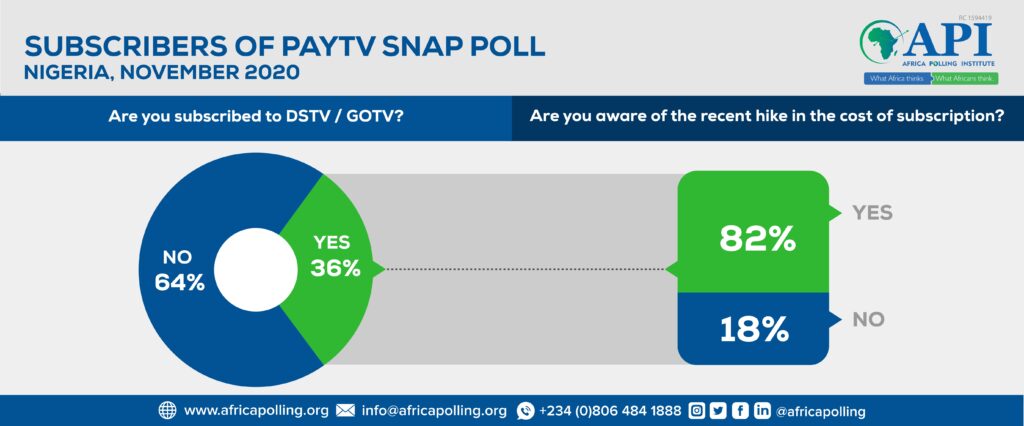
Assessing Citizens Perception on Hike in DStv/GOtv Tariff
The poll also sought to elicit Citizens perception on the tariff hike. Overwhelmingly, 75% of DStv/GOtv subscribers
considered the tariff hike as being expensive and exploitative. On the contrary, 6% felt the tariff hike was affordable,
given the current state of the economy and 2% believed the tariff hike was simply motivated by profit, while 17%
were undecided. Further disaggregation on the data showed that the widely held opinion that the hike in tariff was
expensive and exploitative cut across different demographics. However, while DStv/GOtv attributed the rationale
for the tariff hike to the increase in Value Added Tax (VAT) in January 2020, many Nigerians described the hike as
being insensitive to the plight of Nigerians, considering that the tariff hike came at a period the country was baling
with the COVID-19 pandemic and its attendants negative impact on the economy and citizens disposable income.
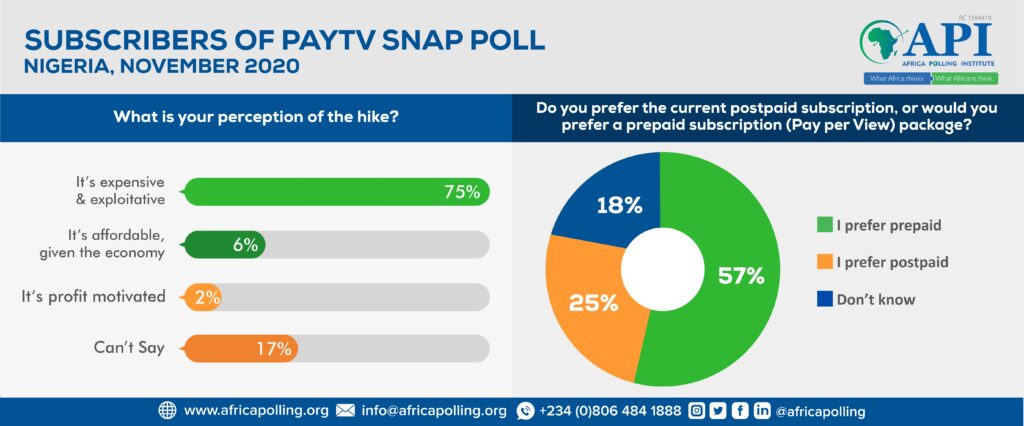
Assessing DStv/GOtv Subscription Preference by Nigerians
Over the years, there have been an increasing debate by Nigerians on whether DStv subscription should continue
on the current ‘fixed monthly tariff’ (Postpaid) or be based on ‘Pay-As-You-Go tariff’ (Prepaid), as obtainable in other
countries. To this end, the poll elicited the views of Nigerians on their preferred subscription package. From the
findings, 57% of Nigerians say they prefer prepaid subscription model. This common opinion of the majority could
be driven by the fact that about 40% of Nigerian subscribers do not fully utilize their monthly tariff either due to
busy daily schedules or absence of regular electricity supply⁹. On the other hand, fewer respondents (25%) say they
prefer the current postpaid subscription model, while 18% say they simply do not know. The majority preference for
prepaid subscription equally reflected across gender, age groups and almost in all the geo political zones except
North-Eastern region, where 57% prefer the current postpaid model. Meanwhile, the majority of respondents who
simply do not know were majorly those with no formal education (83%). However, the increasing frustration of
Nigerian DStv subscribers over poor quality of service and frequent tariff hike has not gone unnoticed by the
Nigerian government. In 2016, the Nigeria’s Consumer Protection Council (CPC) instructed DSTV to implement a
flexible tariff structure after investigating the allegations of consumers’ rights violation.
Similarly, in reaction to the June 2020 DStv tariff hike, the House of Representatives through its Ad Hoc Committee
equally ordered DSTV and other cable television providers to begin immediate implementation of the Pay-As-You-Go tariff’ (Prepaid) policy as well as reduction in subscription cost¹⁰.
Recommendation
In view of the above findings and arising from the apparent disaffection of most Nigerians with the seemingly high
subscription rate of DStv/GOtv in Nigeria, the following policy recommendations are put forward:
I. In the long term, the Nigerian government through the National Communication Commission (NCC), Federal
Competition & Consumer Protection Commission (FCCPC) and the National Assembly in collaborative synergy
with the general public should setup a policy framework that can allow the proliferation in cable television
providers in the country. At the basic level, this effort will help engineer healthy competition in the sector which
will ultimately lead to price reduction in the provision of services therein. While similar effort had aided the
verse consumer utility derived in the privatization of the telecommunication sector in the early 2000s.
ii. In the medium term, a comprehensive review of the available packages (both prepaid and postpaid) can be
undertaken by the above agencies and structure of government. This is particularly because, findings from the
snap poll already indicate that most existing subscribers are not comfortable with the current postpaid package
being used without the option of the former. This they decried arising from the apparent and disturbing
shortage in electricity supply often experienced by subscribers who as a result may not have significant access
to the services as and at when due;
iii. Lastly, and in the short term, the DStv Company should commence a downward appraisal of the current prices
of their services in view of the worrisome spate in poverty and unemployment in the country. The imperative for
this is intended towards having a reasonable and widespread access of willing Nigerians to the various services
the company offers. This will undoubtedly put them in the best light and give Nigerians veritable opportunity to
enjoy the benefits of rich and uninterrupted access to current news, entertainments, sports and lifestyle events
often aired by the company.
Conclusion
The Snap Poll has revealed clearly that over the last 5years, DStv/GOtv has continued to increase subscription tariff
without considering affordability on the part of Nigerians. As shown in the poll, overwhelming majority of
subscribers (75%) considered the tariff hike as being too expensive and exploitative. Majority of Nigerians prefer
prepaid subscription model as against the current postpaid pricing regime. This common opinion is driven by the
fact that most Nigerian subscribers do not fully utilize their monthly tariff either due to busy daily schedules or
absence of regular electricity supply. To this end, the authorities need to wake up to its responsibility by enforcing
adequate regulations to protect Pay-Tv subscribers from arbitrary hikes in tariffs.
Dr. Bell Ihua
Executive Director
Africa Polling Institute (API)
